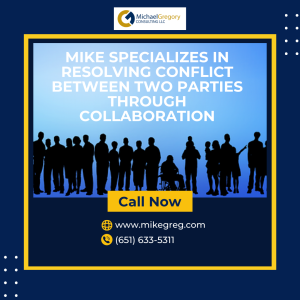Conflict is an inevitable aspect of life, but how you navigate and resolve it can make a significant difference. Consider the method for conflict resolution that empowers individuals to find solutions tailored to their unique requirements i.e. mediation. Please check out this post and understand the transformative power of mediation for conflict resolution.
Mediation is an effective method of resolving disputes, and it offers benefits to individuals, workplaces, and communities. This process brings harmony to different life aspects, from family and workplace disputes to business disagreements and community conflicts. Please read this post and know how mediation makes such a difference:

Voluntary Participation –
Your journey towards conflict resolution starts with your consent. The mediation process ensures that all parties are participants, fostering a collaborative environment.
Confidentiality –
It’s important to speak your mind without hesitation. Confidentiality is the main aspect of mediation that creates a space for open and honest dialogue without any repercussions.
Impartiality –
A professional mediator remains unbiased throughout the negotiation process and guides communication without taking sides. The mediator aims to facilitate understanding and find common ground.
Empowerment of Parties –
Mediation actively involves you in finding solutions while offering you more control than the court-imposed decisions.
Informality –
You won’t need to bother about the atmosphere of courtroom proceedings as mediation creates a setting that improves communication, allowing for a more relaxed and collaborative atmosphere.

Flexibility –
This process prioritizes your unique needs as it adapts to your situation and provides tailored solutions for resolving your dispute.
Understanding the Benefits of Mediation
Resolving Conflicts Early –
Mediation works like a proactive approach to resolving workplace conflict as this method addresses issues before they escalate further. With early intervention, this conflict resolution process enables parties to confront and handle conflicts directly while preventing further escalation.
Preventing Harmful Effects –
Timely mediation is necessary in addressing conflicts as it might negatively impact individuals, the work environment, or collaboration among team members. Mediation offers the right platform for handling such issues timely and effectively.
Better Understanding –
Mediation allows better understanding between conflicting parties as this process facilitates open communication and dialogue. Participants gain valuable insights into each other’s perspectives, providing a better comprehension of underlying issues.
Improving and Repairing Relationships –
Mediation resolves immediate conflicts while improving and repairing relationships. This process recognizes the significance of interpersonal dynamics while creating an environment for improved collaboration and strengthened professional relationships.
Personalized Agreements –
Mediation focuses on empowering parties to produce their own resolutions. This customized approach ensures that agreements are specifically tailored to the needs and concerns of the involved parties while offering a sense of ownership and commitment.

Durable and Satisfactory Resolutions –
With its collaborative nature, mediation offers durable and satisfactory outcomes. Agreements reached through mediation are more likely to satisfy the needs of the involved parties while creating a more stable and harmonious working environment.
Conclusion –
Mediation is an effective conflict resolution method that fosters open communication, understanding, and tailor-made solutions between participants. That’s why this process is considered a powerful tool for creating harmony in personal, professional, and community settings.
Rather than considering traditional adversarial approaches, it’s necessary to embrace the collaborative and empowering world of mediation for effective conflict resolution. So, consider taking help from a professional mediator for conflict resolution in MN and find the perfect solutions possible.
Author Information –
This article is written by Michael Gregory, a qualified mediator with the Minnesota Supreme Court] dedicated to helping clients learn to de-escalate dispute situations, resolve conflicts, and negotiate winning solutions.








